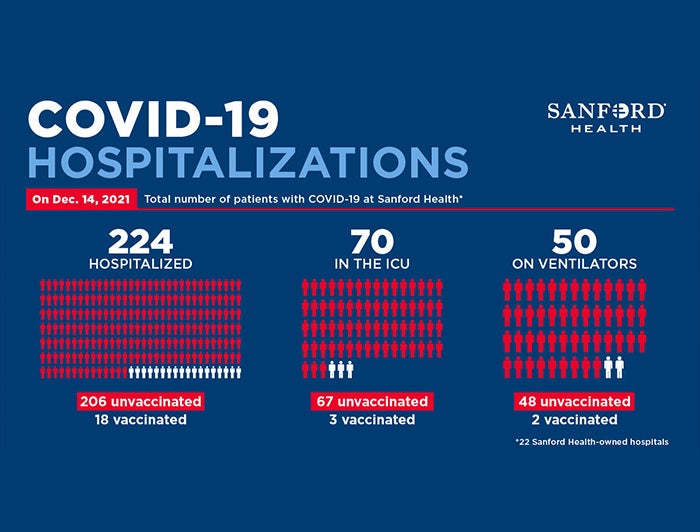As Omicron Variant Spreads, Clinicians Advise: Get Vaccinated or ‘Boosted’

Photo Credit: Sanford Health
Sanford Health, based in Sioux Falls, South Dakota, regularly shares COVID-19 statistics on its social media channels, including number of people with COVID-19 who are hospitalized at Sanford Health-owned hospitals, number of people in the intensive care unit and number of people on ventilators. The numbers are broken down by those who are vaccinated and those who are not.
All of these numbers have increased from early November to mid-December.
In a Facebook Live chat in early December, Jeremy Cauwels, M.D., Sanford Health’s chief physician, discussed the omicron variant with Courtney Collen of Sanford Health News. At the time, the first scientific paper about the variant had been published by researchers in South Africa. Cauwels said this particular study shows the omicron variant has more mutations than delta or other previous variants and though it appears to spread quickly, it may cause milder illness. He noted that the South African population does not have a high COVID-19 vaccination rate, but more people have “natural” immunity. The hope is that the omicron variant will continue to evolve so that it’s more like the common cold, he explained.
Cauwels talked about the toll that increasing hospitalizations takes on the health care workforce. “It is physically and mentally exhausting,” he said, noting that besides caring for patients with COVID-19, front-line teams are providing treatment for patients who have had a heart attack or stroke, have cancer or need surgery. At the health system, COVID-19 is adding “200 extra patients to the top of that.”
Other topics and questions covered during the hour-long live chat include:
What is the best protection against the omicron variant? The best protection is getting vaccinated, Cauwels emphasized: “If you don’t want to be on a ventilator and you don’t want to land in the intensive care unit — and I don’t know anybody who wants to be on a ventilator or in the intensive care unit — the best way to avoid that from a COVID standpoint is to be vaccinated. It is the easiest, safest way to protect yourself from that kind of a complication.”
Do COVID-19 vaccines offer better protection than getting the infection? As part of the chat, Susan Hoover, M.D., infectious disease specialist at Sanford Health, talked about the importance of getting vaccinated rather than thinking getting the infection will offer protection. “COVID vaccines are amazingly safe and effective. We have a year plus of data about them now, not just from the thousands of people who were in studies but now the millions of people around the world who’ve received this vaccine.” She added, “Getting COVID-19 — natural infection — is much riskier than the known risks of any of the vaccines. … The immunity [from the vaccine] prevents, if not all infections, it prevents serious infections — hospitalization, needing a ventilator, dying.”
As the holidays approach, what should people do as we wait to learn more about omicron? “It’s not time to do anything different,” said Cauwels. “If you’re going to be in a large crowd, wear a mask. Make sure you’ve gotten your vaccination. Make sure that you can maintain social distancing when you’re able. Wash your hands. If you’re sick, stay home. All of those things still apply.”
Cauwels advised, “Just recognize that this variant is out there, and that we have to continue to be vigilant, we have to continue to be careful as we move into the holiday season.” He added, “For those folks who are worried about the new variant … what we know is that the vaccines still do their job.”
Hoover also stressed the importance of getting vaccinated to protect each other: “This is about not only protecting me, but protecting the community. So my getting a vaccine and wearing a mask protects me and also protects those who are too young to get a vaccine — which right now would be children under 5 — and those in whom the vaccine wouldn’t work as well — maybe people getting active treatment for cancer and immunocompromised people. So it’s about our community working together and caring about other people’s health, not just our own.”
Is the end of the pandemic in sight? Not yet, but Hoover said there is hope. “One very exciting thing about this particular time is that both scientists and doctors and the public are learning about this together. Exactly what it will take to end [the pandemic] isn’t known yet and anything anyone tells you is speculation. But it’s something that people are working on every day to figure out what comes next and how do we handle this.”

